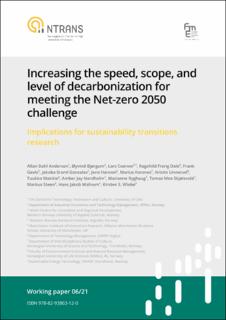Increasing the speed, scope, and level of decarbonization for meeting the Net-zero 2050 challenge. Implications for sustainability transitions research
Andersen, Allan Dahl; Bjørgum, Øyvind; Coenen, Lars Martel Antoine; Dale, Ragnhild Freng; Geels, Frank W.; Gonzalez, Jakoba Sraml; Hanson, Jens; Korsnes, Marius; Linnerud, Kristin; Mäkitie, Tuukka; Nordholm, Amber Joy; Ryghaug, Marianne; Skjølsvold, Tomas Moe; Steen, Markus; Walnum, Hans Jakob; Wiebe, Kirsten Svenja
Research report
Published version
Permanent lenke
https://hdl.handle.net/11250/3048047Utgivelsesdato
2021Metadata
Vis full innførselSamlinger
- Publikasjoner fra CRIStin - SINTEF AS [5801]
- SINTEF Digital [2501]
Sammendrag
This viewpoint identifies three interrelated transition imperatives to achieve net-zero emissions
by 2050 – increasing the speed, scope and level of decarbonization. First, the urgency of climate
action places temporality and radically accelerated sociotechnical change at the heart of the net zero 2050 challenge. Second, the net-zero challenge implies a broadening of decarbonization
efforts from the usual focus on electricity and transport to all sectors of the economy and a need
for thinking across multiple sectors. Third, increasing levels of decarbonization necessitates
widespread and rapid diffusion of low-carbon solutions with limited time for experimentation
and deliberation. Interactions between these imperatives create research challenges related to
time frame tensions, tipping points, sector couplings, multi-sector technologies and massive
upscaling. ISBN: 978-82-93863-12-0
